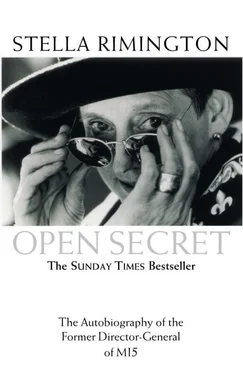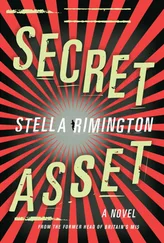We stayed in that house until I was about eighteen and it did not improve. In fact for Mother it got worse, as her only sister, my Auntie Lilian, to whom she was very close, came there to die when she developed cancer. That was a very grim period. I had been very fond of Auntie Lilian, with whom we had shared our wartime experiences in Wallasey. After my grandmother’s death she had continued to live in the big flat in Church Street which they had shared and where we had stayed during the bombing. She came to stay with us often and always at Christmas, when it was her job to set the table for Christmas dinner and I often went to stay with her on my own. I loved going there; she had kept my grandmother’s furniture, which dated from the time when their lives had been rather grander – brass bedsteads, a big mahogany table and chairs and a heavy mahogany sideboard with fantastic carvings on it. My brother and I used to look at the carvings through a magnifying glass to frighten ourselves when we were young. She also had a piano stool, with a green top that spun round and round; we used to play Wallasey buses with that. My brother had an encyclopaedic knowledge of the stops on all the local bus routes, and he would be the driver with the piano-stool wheel, while I was the conductor, ringing the little brass bell. My mother used that same bell to ring for attention when she got very old. There was one other particularly marvellous thing in that flat, which was an old knife-cleaner. You put the knives in slots at the top and some grey powder in another slot and then you wound a wheel round and round as fast as you could and there was a satisfying grinding noise and the knives came out shiny. I saw a similar one in an antique shop not long ago. When things from your childhood start appearing in antique shops, you know time is beginning to run out for you. It is the same sort of shock you get when you learn that children are studying the period of your childhood as history.
Auntie Lilian worked on the telephone switchboard in the warehouse of a firm called J. Langdon and Sons in Duke Street, Liverpool, crossing the Mersey on the ferry-boat from Seacombe every day. It was a job well beneath her capacity, for she was intelligent and well educated, but she was a casualty of her times, and of their curious family history. She had not been brought up to work, but found herself having to do so. Although I was so fond of her, I feel ashamed to remember that I found myself almost unable to go in to the bedroom to see her when she lay dying in our house. We had only three bedrooms and Brian had to sleep downstairs so Lilian could have his room. She was next door to me and I could hear her drumming on the wall when the pain got very bad.
My mother’s gloom about the move to the Midlands was not helped by my arriving home on my first day and announcing that I hated my new school and I would never settle down there. It must have been the last thing she wanted to hear at the end of a frustrating day spent scrubbing an intractable floor. I found Nottingham Girls’ High School a bit of a shock after the cosiness of the convent. Apart from anything else, I had exchanged my bike ride along quiet roads for a journey which involved a walk down the hill, a trolley bus ride, and then a seven-mile bus journey into Nottingham. It is a sign of the big social changes that have taken place since then that I was despatched on that journey quite alone at the age of twelve with as far as I know no particular anxiety on the part of my parents. I can only once remember anything alarming happening. It was on one return journey when I must have been about thirteen, that a man came and sat next to me on the top deck of the bus. He put his hand on my thigh and all through the journey he stroked it, gradually pulling up the side of my skirt. I was far too scared to say anything to him or to get up and change seats, but he can’t have been too determined as he had not succeeded in reaching my bare leg before it was time for me to get off the bus. When I got up, though, I realised that my skirt was all crushed where he had been folding it into his hand. I was too embarrassed ever to mention this to anyone.
It was a big change for me to go from a small school in large grounds to a large school with no grounds. The school was a series of houses in a then run-down street in a city and it was a most impractical arrangement. It had grown gradually by acquiring more and more houses, not all of which had been joined together, so the girls had to go out in the open air, come rain come shine, as they went from one lesson to another. On the other side of the street was a row of houses which have now been knocked down to let the school extend over the road. A few years ago, when I gave away the prizes at the school speech day, I told the girls that when I was at the school, I had whiled away my time during boring history lessons by gazing out of the classroom window into the windows of the houses across the road, and watching people having their tea. ‘I was a spy at school, says MI5 boss,’ announced the Nottingham Evening Post .
In fact there was not a great deal of time to be bored at that school. There were some fiercely efficient teachers there, like Miss Pretty who taught History. She drummed information into us by a combination of sheer strength of personality and fear. She would regularly announce at the end of the lesson, ‘Test tomorrow,’ and we knew we had to go home and learn up everything that had gone before. She never forgot. The next day she would come striding across from the staff-room in her sensible lace-up shoes and mid-calf tweed skirt and as she swept into the classroom she would be already saying, ‘First question: What was the date of the Drei Kaiserbund ?’ She was not the only terrifying teacher in that school.
Miss Todd was equally efficient at dinning Latin and French into us. We learned from those teachers largely I think through fear of their scorn should we fail. The younger teachers could not match their power, though we much preferred their lessons.
I soon settled down and learned to operate in the bigger pond of that school. In the late 1940s, Nottingham Girls’ High School was providing an extremely sound and traditional education for girls from all social classes. Although it was a fee-paying school, the fees were small, something like £12 per term, a sum my parents could afford without too much difficulty. But it also provided a considerable number of free places for those whose families could not afford the fees and the result was a group of girls from very mixed backgrounds.
One of my closest friends was Jean Hardy, a girl whose father had disappeared fighting in the Far East, and was later found to have died in a Japanese prisoner-of-war camp. Her mother had been left, not knowing for years whether her husband was alive or dead, to bring up their two daughters with very little money in a prefabricated house in Nottingham. Both girls went to the High School and Jean’s time there totally changed her life, opening up opportunities and giving her contacts which she could never otherwise have had. My education seems to me superior in every way to the education my daughters received at similar schools in London in the 1980s. We came away with an ability to spell, a sound understanding of grammar, helped by a grounding in Latin, French and German, a certain facility in mental arithmetic, although mathematics was never my strong suit, an outline knowledge of the history of Britain and Europe and of English literature, including, as far as I am concerned, a store of quotations which once learned have never been forgotten. They seem to have acquired very little of this.
What the school did not provide was any focus on what the girls were going to do with their lives. There was no career information offered and no thought of choosing a university course with a career in mind. The teachers thought that their responsibilities began and ended with getting us with credit through the public examinations, and encouraging the brighter of their charges to go on to university and then getting them in. They made it very clear to us, too, that the only subjects worth taking at university were the academic ones – English, History, the Sciences or Mathematics for example. Jean Hardy, who was a bright girl, deeply upset the teachers by announcing that she wished to take Sociology, and although she successfully obtained a place at Bedford College, she was regarded as having in some way let the school down.
Читать дальше












